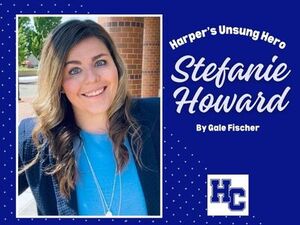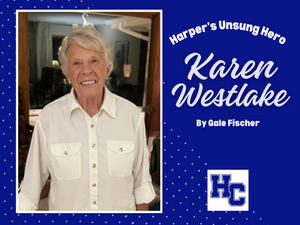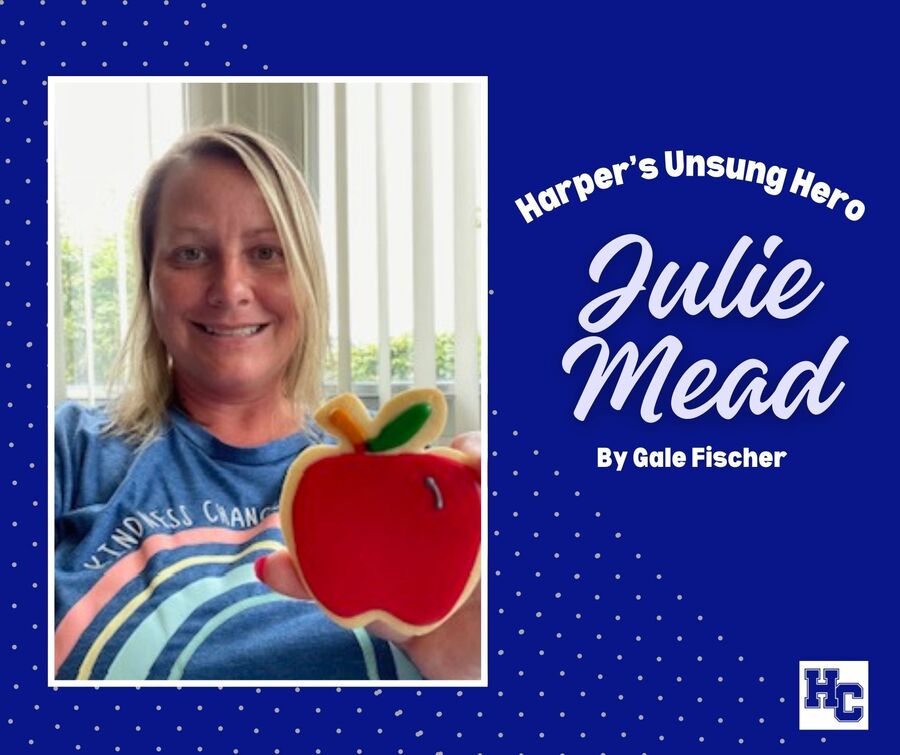Harper’s Unsung Heroes
March 2024
Written by Gale Fischer
A Road Less Traveled
“The road of life twists and turns, and no two directions are ever the same. Yet our lessons come from the journey, not the destination.”
—-Don Williams
Although comfort and predictability can ease the mind and soothe the soul it is not always the path of life that many are set out to follow. Unexpected experiences, whether pleasant or not, undeniably play a part in the trajectory of life. Having aspirations, setting goals, and planning for the future are all part of a wise blueprint but preparing for the unexpected can be just as important. Knowing how to make the best of all that life throws at you and making decisions at these various checkpoints to guide your future can provide the foundation for survival. Understanding what you want in life and seeing things pan out like you dreamed can be exciting but relishing in the unexpected can be just as fulfilling. This month’s Harper Unsung Hero, Julie Mead, has traversed a jagged road filled with twists and turns that she couldn’t have imagined. This road has led her to the mom, the wife, and the teacher she is now. It has defined her destiny.
Julie’s life story has been one of not looking too far in the distance to plan for her future. With all of the changes in zip code as a child, she did her best to recall all the details of her younger years. “I was born in Dubuque, Iowa January 22, 1983.” She is the youngest of three children with her oldest brother Jason born five years before her and Jeff three years younger than Jason. “We moved from Iowa to Willmington, North Carolina when I was just a month old. Not long after this, we moved to Cleveland, Ohio for a brief stay before settling into a new home in Dublin, Ohio when I was four years old. I attended preschool there and completed my first few years of elementary school. When I was in third grade we moved to Florida. We lived there through my middle school years.” Julie’s father was an engineer and was always moving up in his profession, finding the next job in a new location. His skills as an engineer may have influenced her parents’ decision to build a new home with each move.
Although the stay in Florida was short, just like the others it provided Julie with some of her first childhood memories. “I can remember our PE teacher taking us outside and teaching us how to crack pecans with our bare hands. The trick is to hold two pecans together in one hand and the force of the two together in one fist would crack them.” Constantly being uprooted and being the new kid on the block can be traumatic for children but Julie seemed to thrive with this lifestyle. “I remember having many friends. We had moved a lot and I learned how to be friends with new groups with every move. I had groups of friends with different sports that I played and I had a group of friends from kids in my neighborhood.”
Julie and her family transitioned to another state again as she began her high school years. Julie talks about her experience as a teenager living in the southeast. “In the middle of my ninth-grade year, we moved to Columbus, Georgia. I was always a well-behaved student, earned good grades, and made friends easily, but school was different in Georgia.” Julie quickly learned to adjust to the cultural differences in her new home. “Living in the South was different from what I had experienced. You were expected to greet adults with “Yes sir and yes mam. I had not experienced this and would get in trouble early on but quickly learned how to greet adults.”
Julie and her family spent her ninth and tenth-grade years in Georgia. She reflected on some of the rich experiences of this time in her life. “I played softball with our team experiencing lots of success. We finished runner-up in the state. Other sports that I participated in include cross-country and soccer.” Julie also had many adventures outside of school that helped to shape her life later as an adult. “Social life in Georgia was Christian-based. I started going to church youth groups and Bible Camps with my friends.” Julie also had her first taste of working while in Georgia, earning money babysitting.
Julie’s family would make a move once again, packing up and moving to Michigan during her junior year of high school. Julie describes how moving to Marshall was different from each previous move. “Both Mom and Dad were born and raised in Marshall so when we moved there it was like a home base because we had spent a lot of time there prior to our move, for Christmas and summer breaks. I always enjoyed coming back to Marshall for Christmas because of the snow. I have fond memories of sledding down Dead Man’s Hill.” Moving to Marshall gave Julie a chance to spend some extra time with her extended family. “I moved to Marshall with Dad while Mom and Jeff stayed in Georgia. Mom stayed to sell the house and wait for Jeff to finish his senior year of high school. Dad moved in with my grandparents and I stayed with my aunt, uncle, and my cousin. When Mom sold the house she joined us in Marshall and we moved into a condo.”
Although Julie was able to adjust well to each move as a child there were some difficulties. She discusses the challenges of transitioning from one school district to the next. “When I was a kid there wasn’t a common core curriculum so moving from state to state and attending schools across the country wasn’t always easy. The curriculum content was always different so often it felt like I was starting over again as a student.”
Having the opportunity to live in different areas of the country did provide Julie with some wonderful memories. It felt as if she was always traveling almost like she was transitioning from one vacation to the next. It gave her the tools and skills to be able to adjust to unexpected circumstances while also encouraging her to spread her wings and immerse herself in different experiences in her youth and as an adult. She learned how to step outside of her comfort zone. She would continue this pattern of branching out by leaving the nest on her own as a young adult and later in life. Julie reflects on some of her experiences traveling. “At the time I was in Marshall it was common for kids in the area to go work for the summer at Yosemite National Park. I went there to work two summers during college summer breaks. One season I worked in the general store and another summer I ran the art studio. I was able to take art classes and have a portfolio of Yosemite-themed mixed media work. I had always enjoyed art as a child so felt blessed to run the art studio. I still practice art at times and incorporate it into scrapbooking.” Julie continued this pattern, visiting several states and traveling abroad frequently before settling down and raising a family.
After graduating from high school in 2001 Julie enrolled at Grand Valley State to pursue her passion. She gives details about her aspirations beyond high school and college. “I went to Grand Valley after high school. I wanted to pursue a degree in international business with a major in Spanish.” One of Julie’s high school teachers left a lasting impression on her that ignited her passion for Spanish. “I remember my first high school Spanish class. My teacher made it fun by incorporating a lot of hands-on activities. This kind of spurred my interest in Spanish.” Julie’s desire to explore played a part as well. “I also wanted to travel the world and I thought a degree in international business would be a great way to do this. My dad had visited many places through work. He realized that the job world was becoming more international and he encouraged me with this major.”
Julie eventually lost interest in pursuing a degree in International Business. She describes this transition of switching from business to education. “I really didn’t enjoy my business classes at Grand Valley. I decided to switch to elementary education with a Spanish major.” She also transferred schools. “I eventually transferred to Spring Arbor in 2003. I wanted to be in a smaller school.” While at Spring Arbor Julie continued to follow her passion for international travel. “I did a summer semester in Mexico. It was hard work but I really enjoyed my summer in Mexico. It left me with lasting memories”
Julie graduated from Spring Arbor in 2005 and began her chapter as a teacher. She describes her first assignment as an educator. “Things were much different then with each open teaching position receiving hundreds of applicants. My first teaching job was at a K-8th grade Montessori School in Southgate, near Detroit, teaching Spanish.” Julie embraced the Montessori approach and took classes to get her Montessori certification. She taught there for two years and would have stayed longer but the pay wasn’t great. It was time to look elsewhere. “I found a job at a charter school in downtown Detroit, at Detroit Service Learning Academy. It was a project-based learning system so we did a lot of things in the local community. The leadership at this school was phenomenal and I was able to learn a lot and expand my knowledge base. I taught Spanish for grades third through eighth.”
Teaching in the heart of Detroit was a cultural shift for Julie. The experience was a transition but it enriched her life. She adjusted rather easily and enjoyed the opportunity. Much of what she learned from both her time at Southgate and Detroit Service and Learning Academy has helped to guide her current teaching practice and philosophy. During the period in Detroit Julie would begin a new chapter of her personal life as well. She reflects on this stage of her life. “While I was working there I married my first husband Ron. We had a baby, my first child, Ronnie. Ron and I divorced soon after Ronnie was born and suddenly I was a single mom.” This was a challenging period for Julie. “My dad passed away four months after Ronnie was born. I had also recently gone back to school to earn an MA degree in Curriculum Assessment and Leadership. My mom would come from Marshall to help me out. Being a single mom along with work demands just got to be too much. I needed to be closer to Marshall where I could have more support from family so I started looking for a job near home.”
Her years of teaching Spanish would pay dividends making her very marketable. Julie talks about the next big transition in her life. “Lakeview had a Spanish position available at the elementary level. I started teaching there in 2009, traveling between Minges and Prairie View. I taught there for four years.” Marc, a good friend of Julie’s from high school, would come to Detroit to hang out with her while she was still at the Learning Academy. When she moved back to Marshall they began spending more time together and started dating. They were married in 2012. Marriage, being a mom, and a move from Detroit to Marshall presented a busy time in Julie’s life. The work she did while at Lakeview added to this theme. “I helped to build a curriculum there. We had a team of fifteen Spanish teachers. At that time foreign languages in schools were booming.”
Julie made the move from Lakeview to Harper, joining the staff at Harper Creek Middle School as a Spanish teacher in 2014, but not before a major milestone for her family. Julie and Marc were also blessed with twin girls, Mattie and Kora in 2013. This was a time of joy and happiness but it also presented a time of struggle for Julie, Marc, and Ronnie. The births of Kora and Mattie would eventually change the trajectory of Julie’s personal life and teaching career. Julie describes this period of time. “Both girls had some oxygen deprivation during labor. Mattie was born twenty-five minutes after Kora. Normally twins are born only a few minutes apart. Mattie was losing oxygen and so was I. The medical team was ready to do a C-section. Fortunately, Mattie came out before the C-section could happen. Even with the complications at birth, it seemed that both Mattie and Kora recovered quickly, or so it seemed.”
Julie and the girls were sent home with a clean bill of health but soon things didn’t seem quite right. Julie discusses the red flags that told a different story. “From my viewpoint as a mom, things seemed fine but the doctors kept trying to tell me differently. Soon enough the girls started missing major milestones and I began to understand that things weren’t quite right. At their nine-month well check, both were referred to Early On. At this time Mattie still was not talking. Neither Kora nor Mattie were showing any signs of acquiring gross motor skills. Kora was able to talk and would often communicate for Mattie.” Both Kora and Mattie were evaluated at eighteen months and their special education journey began with an ECDD (Early Childhood Developmental Delay) eligibility. Julie describes the next phase of their lives. “Kora and Mattie started receiving special education services including OT, PT, and Speech Therapy. I was also always working with them at home. Eventually, they went to an ECDD classroom in Albion.”
Julie consumed her life by helping her girls get the help they needed. Kora and Mattie would spend half days in the ECDD classroom and the other half in Our World Preschool in Battle Creek. The teachers at Our World were always worried about the delays the girls were experiencing. This was a huge stressor for Julie. Sure, she wanted them to learn and grow but she was also realistic and didn’t expect them to be able to do the same things as their peers. She realized that attending Our World wouldn’t bring them up to speed but she firmly believed being there would give them a huge boost. Mattie and Kora were eventually pulled out until they were potty trained. Julie was navigating the system trying to push for services when therapy sessions were constantly being cancelled. It seemed at times that she was on an island. Marc and both grandmas were still holding on to hope that everything with Kora and Mattie would be fine and that they would catch up with their age group peers, but Julie realized the seriousness of the situation. Ronnie had to take a back seat, creating another layer of stress for Julie.
Julie was growing frustrated as she advocated and tried her best to ensure the twins received the needed services. Finally, she decided to take on a major commitment to try to help her girls. She discusses the next phase in her life. “I decided to pursue a special education degree to provide me with insight into how I could help Mattie and Kora grow and learn.” It wasn’t necessarily Julie’s intention to transition from teaching Spanish to becoming a special education teacher. She felt under-equipped as a mom for her girls and wanted to learn more about how to best meet their needs. “I enrolled at Spring Arbor in 2015 to start work for my special education degree. It was challenging as a parent of two children with special needs and a normal developing child while working full time, and trying to get another degree.”
At times it may have felt as if she were drowning, but Julie never gave up. She knew she needed to continue to learn about the nuances of Kora's and Mattie’s unique needs. She describes how it took longer than she anticipated to earn her degree but how it was worth the effort. “Ronnie was playing traveling sports and I still tried to devote time to this. It took longer than I wanted to finish my coursework because of all of this. I finally earned my degree in 2020. I was learning a lot and I feel it helped me a lot with Kora and Mattie.”
While Julie was still working on her special education degree she and the twins would face some more life transitions. Julie talks about the shift for her, Kora, and Mattie to the Wattles Park family. “In 2018 there was a Spanish teaching position opening at Wattles Park and I decided that this would be a good time to move to the Elementary School so that I could bring the girls with me to school each day when they moved on to Kindergarten. Mattie and Kora started kindergarten at Wattles Park in the fall of 2019.” Being immersed in the elementary general education setting was a challenge for both the girls and their teachers. Mattie and Kora’s eligibility was ECDD but this eligibility expires when children turn eight years old. Both Mattie and Kora would need to be re-evaluated in first grade to determine their new special education eligibility. The testing determined that both were cognitively impaired. Julie talks about the challenges of Mattie and Kora spending the majority of their school day in a general education classroom. “The transition to Kindergarten wasn’t easy. They were a challenge indeed for their teachers but I still felt that they would have a better chance to make progress in the general education setting. Their teachers continued to work tirelessly for ways in which to provide support for them”
Having students with such significant delays in their classrooms was something new for the staff at Wattles Park. Kora and Mattie being there provided a glimpse for the staff of what was to come. A transition was on the horizon for WPE and for Julie as a teacher. Julie reflects on this. “In the fall of 2020, the district elementary CI (Cognitively Impaired) classroom was moved to Wattles from Sonoma. It was reclassified as an Early Learning Room and I applied for the position.” When Julie initially pursued a degree in special education it had nothing to do with becoming a special education teacher. It was something she longed to do to help her become a better mom for Kora and Mattie. It seemed, however, that the in-district move of the CI classroom to Wattles Park was Julie’s destiny calling her. “I was excited to transition from Spanish to a self-contained special education classroom and to start trying to utilize the things that I had learned in graduate school. I also felt I could use my background as a Montessori teacher and my love for art in this new teaching position. It seemed like this was my calling and all that I had done personally and professionally had led to this.”
This new experience was a breath of fresh air for Julie but not without bumps in the road. “It turned out to be the hardest teaching year of my life. We were coming off COVID so this added another element. Trying to work with my in-person students while teaching kids who were home with COVID virtually at the same time was challenging. Also, the behaviors of kids were not what I expected.” A part of Julie must have felt vulnerable as if she had chewed off a bit more than she could manage but she would continue to plug away. “I was also in the last year of my MA courses so had to spend time at night with coursework. I was trying to teach all subjects to all of my students while also figuring out how to schedule planning time and time to get kids out into the gen education classroom. Retired Harper Creek special education teacher, Shelly Word, was a big help and the two of us would brainstorm together for solutions.”
It seemed that Julie was a perfect fit for this position. She had spent tireless hours advocating for her girls for many years which had helped her to become a great advocate for her special education students. She acknowledges the hard work her general education co-workers have put in for Kora, Mattie, and her students and appreciates their willingness to step out of their comfort zone. “This was a new experience for our staff. It wasn’t easy for teachers to try to figure out how to teach students who were much lower academically and behaviorally than their general education peers. I knew that my girls would be spending some time in my classroom so this was one of my sources of inspiration for the work I put into my classroom. I strived to create a classroom that I would want my girls to be in. The shift for having these students in our building was hard for me but also challenging for our staff and still at times I felt like I was on an island.”
Julie talks about the growth she has seen in her students and the benefits they receive from being with their general education peers as well as the growth of the entire WPE staff, including herself. “The first year with the Early Learning Room in our building was a huge learning curve. Now we are in the fourth year with the Early Learning Room. We have grown as a building. Kids with Cognitive Impairments are spending more time in their general education classrooms than in the first year. Teachers are learning how to differentiate and accommodate not only our highest-needs students but all of our kids. When these children are adults they will be out in society with everyone else so in one sense we are preparing them to be around others and for others to be around them.” For kids with cognitive delays like Julie’s students, including her girls, the easy thing might be to have them spend most of their time in a self-contained classroom. Still, the benefits that all students have received from the inclusion model have made the effort from the entire WPE staff worth it. Julie’s mantra as a mom really puts it into perspective. “I just want what any parent wants, for my girls to be accepted and supported so they can become productive and kind members of society.”
Julie spent her childhood moving from community to community and school to school. This along with her experience traveling as a young adult brought some challenges and great memories. Being hit with constant transitions prepared her for the changes she would face as a parent of two children with developmental delays. Her commitment and time spent advocating for her girls have prepared her to provide the same level of time and commitment for her students. Advocating for students with significant learning delays to share educational experiences with their general education peers has been her passion. Being educated in this way is their right but more importantly than this is that it equips them and all students with the best possible experiences for learning and life later on as adults.
Gale Fischer has spent most of his career as a special education teacher for Wattles Park Elementary dating back to 2001. He is an avid runner and began writing the stories of local runners twelve years ago. Many of these stories have appeared in the Battle Creek Shopper and the Battle Creek Scene Magazine. Recently he started capturing the stories of Harper Creek staff members. His column, Harper's Unsung Heroes, features a different staff member each month. He believes that everyone has a story that can inspire others.
 Harper's Unsung Heroes - Stefanie Howard December 17, 2025
Harper's Unsung Heroes - Stefanie Howard December 17, 2025
Stefanie attended Harper Creek Schools starting in 1st Grade, all the way through high school graduation. She developed a love for school as a young student at Beadle Lake Elementary. Upon graduation, she started at MSU with hopes of earning a marketing degree, but this didn’t last long. She quickly switched her focus to education. Her teaching career began in Houston, but she would eventually return home.
 Harper's Unsung Hero - Matt Bilger December 3, 2025
Harper's Unsung Hero - Matt Bilger December 3, 2025
Matt grew up in the Bilger family, the second of four children. He was different than his siblings, the first in his family to participate in athletics. Through these differences, Matt has been able to find his own niche as a teacher and a coach. He has developed a passion for his career, making an impact on current and former Harper Creek students.
 Harper's Unsung Hero - Karen Westlake October 30, 2025
Harper's Unsung Hero - Karen Westlake October 30, 2025
Karen spent her career seeing the world working in the airline industry. The experiences as an airline attendant provided a lifetime of memories. Looking for an opportunity to get out of the house each day, a few decades after retiring, Karen joined the Harper Creek family a year ago as a lunch and recess aide.








